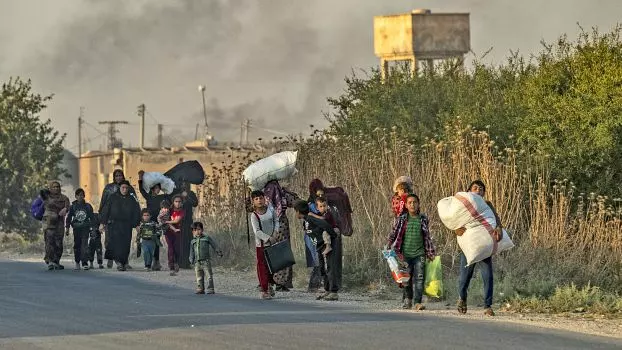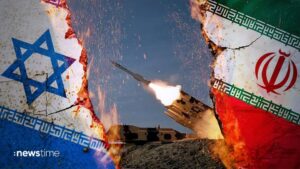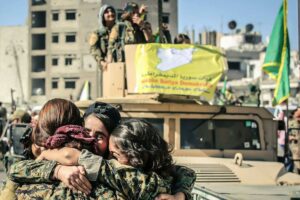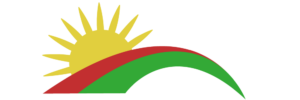The conflict between Israel and Hezbollah has been escalating for several weeks. The IDF’s Golani Brigade has so far been unable to achieve the desired success with its ground offensive in southern Lebanon and has been bogged down after in very short time by a well-prepared, heavily armed opponent. Nevertheless, the IDF was able to achieve important tactical objectives through its absolute air superiority by killing large parts of Hezbollah’s leadership with fighter jets and drones. In doing so, they showed no consideration for civilian casualties and razed entire neighbourhoods of Beirut to the ground. More than 2000 people have already been killed by Israeli attacks, with air strikes accounting for the absolute majority of these deaths.
It is also precisely these large-scale air strikes on civilian areas that have caused over a million people to flee Lebanon. Around 20,000 of them fled to the self-governing areas of northern and eastern Syria.
Demographics of the refugees
Since the end of the Second Lebanon War in 2006, Lebanon has been a place of relative peace and stability within the Middle East. Accordingly, it also attracted a large number of displaced people from neighbouring war-torn countries such as Syria and Iraq. Many people who are now making the journey from Lebanon to Syria are the same people who fled the Syrian civil war in the other direction a few years ago. A large proportion of those who have crossed the Tabqa and Manbij border crossings in recent days to find refuge in the self-governing areas are also originally from northern and eastern Syria, but people from other parts of Syria and Lebanese nationals are also among them. While the people from the region are allowed to travel on to their families immediately, the first temporary camps have been set up for the others. These camps are intended to offer protection until the people can either return to Lebanon or a permanent place of residence has been found for them. Even if there is no official information on this yet, it can be assumed that the newly established camps, similar to the camps in Şehba , will immediately begin to build democratic structures so that the residents can take their problems into their own hands and have a concrete say in their own lives. In this way, they should immediately have a voice in the politics of the region and not live in isolation from the rest of society.
General difficulties
As anyone familiar with the situation in North and East Syria will without a doubt allready know, the situation in the self-governing areas is extremely tense. Due to the embargo and the attacks by the Turkish state, it is becoming increasingly difficult to ensure adequate supplies for all inhabitants of the region. A detailed analysis of this situation and the Turkish state’s underlying strategy is beyond the scope of this article. However if some readers want to delve deeper into the issue, we can recommend the excellently researched articles by the Rojava Information Centre, as well as our own blog articles on this topic.
These already tense conditions are further exacerbated by the arrival of thousands and thousands of people who, of course, cannot be immediately integrated into the economy. If you already have difficulties providing your own population with water, bread and one or two hours of electricity a day, coping with a wave of refugees is no easy task. Nevertheless, the local government is sticking to its humanitarian principles and reaffirms its determination to welcome every person seeking refuge in the region with open arms.
Difficulties with humanitarian aid
Humanitarian aid is needed to fulfil this kind of task. However, this is difficult to obtain as the self-administration is not recognised by the international community. International aid therefore goes directly to the Syrian state, not to the revolutionary areas. However, the state has no intention of passing on this aid, which is intended for the north-eastern part of the country, to the self-administration. On the contrary, it is using it to blackmail the self-administration and further increase the pressure that the blockade is exerting on the region.
In order to enable the delivery of at least the most essential supplies, for example for disease prevention in the existing camps, border crossings connecting Rojava with neighbouring countries would have to be reopened. The border crossings to Turkey are of course not an option, the Turkish state only keeps the crossings to the areas of Rojava it occupies open. The self-administration is therefore demanding the opening of the border crossing to Iraq Til Koçer (arb. Yarubiyah), which was closed in 2020.
It is time for international solidarity
For the foreseeable future, the self-administration is therefore on its own with the refugees. It cannot count on any help from the UN to cope with the extremely complex task of providing a dignified life for thousands of new people in such harsh conditions. In particular, the approaching winter and the need to provide people with heat is a very complex and expensive task. The only ally the local government can rely on in this situation is the International Solidarity Movement. As people in solidarity with Rojava and living in Europe, we are the only ones who have both the will and the financial means to actively support the forces on the ground in the challenges they face. The Kurdish Red Crescent (Heyva Sor a Kurdistanê e.V.), the leading aid organisation in the region, which provides medical care in the camps, has already set up a donation account for this purpose:
BANK ACCOUNT:
Heyva Sor a Kurdistanê e.V.
Kreissparkasse Cologne
IBAN: DE49 3705 0299 0004 0104 81
BIC/SWIFT: COKSDE33XXX
PAYPAL: heyvasorakurdistan@gmail.com
paypal.me/heyvasorakurdistane
Reference: Migrants from Lebanon
Donations for emergency winter aid can also be made to International Emergency Aid:
The willingness of the self-government to take in tens of thousands of refugees in a time of deep crisis is an act of lived international solidarity, it is within our power to support these efforts with another act of lived international solidarity.




